 |
 |
 |
 |
 |
 |
 |
 |
 |
 |
|
KICP News
|
KICP News, 2011
Bruce D. Winstein, 1943 - 2011 March 1, 2011 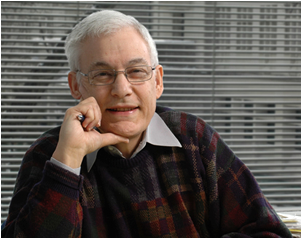 Related Links: KICP Members: Bruce D. Winstein Congratulations to Prof. Angela Olinto! May 26, 2011 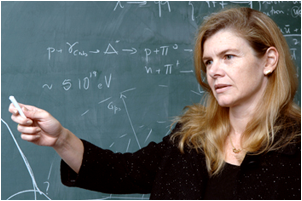 The Quantrell Award is believed to be the nation's oldest prize for undergraduate teaching. Based on letters of nomination from students, the award is among the most treasured by faculty. Related Links: KICP Members: Angela V. Olinto Congratulations to Dr. Alison Brizius! June 6, 2011 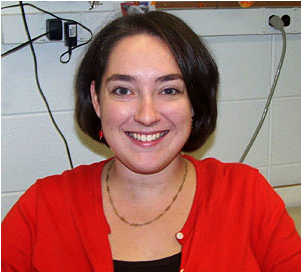 Related Links: KICP Members: Bruce D. Winstein KICP Students: Alison Brizius Scientific projects: Q/U Imaging ExperimenT (QUIET) Congratulations to our postdoctoral fellows! They are moving up! June 17, 2011 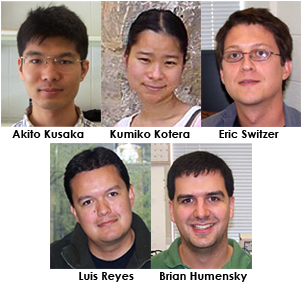
We're all rooting for you, Good Luck! Related Links: KICP Members: Brian Humensky; Kumiko Kotera; Akito Kusaka; Luis C. Reyes; Eric Switzer Congratulations to Prof. Andrey Kravtsov! July 1, 2011 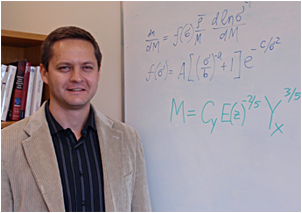 Related Links: KICP Members: Andrey V. Kravtsov Congratulations to Dr. Jean-Rene Gauthier! July 14, 2011 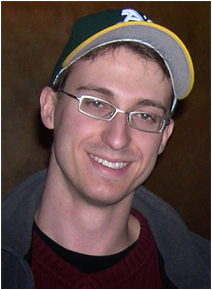 "Jean-Rene's PhD thesis has provided new insights into the growth of massive galaxies, discovering the unexpected presence of extended reservoir of cold gas. In the fall, he will be starting a new position at Caltech as a Millikan fellow." - Hsiao-Wen Chen, PhD advisor. Related Links: KICP Members: Hsiao-Wen Chen KICP Students: Jean-Rene Gauthier Congratulations to Dr. Matthew Bayliss! July 18, 2011 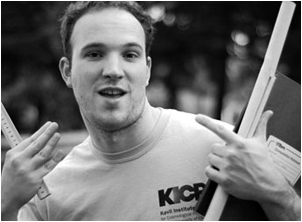 "Dr. Bayliss' Ph.D. research has focused on the identification and characterisation of several new large samples of gravitational lenses. In particular, his work with both imaging and spectroscopic data, from a range of telescopes, has established for the first time the redshift distribution of the lensed sources, which is a major milestone in using these lenses as cosmological probes and as environments in which to test our understanding of dark matter halo structure." - Michael Gladders, PhD advisor. Matthew has received a postdoctoral research fellow position at Harvard University. Related Links: KICP Members: Michael D. Gladders KICP Students: Matthew B. Bayliss Congratulations to Dr. Zosia Krusberg! July 18, 2011 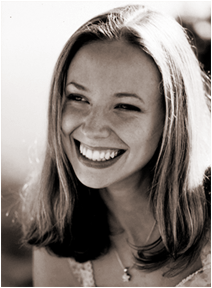 Zosia has received a position of Visiting Professor in the Department of Physics and Astronomy at Vassar College. Related Links: KICP Members: Edward W. Kolb KICP Students: Zosia Krusberg Congratulations to Dr. Cora Dvorkin! July 20, 2011 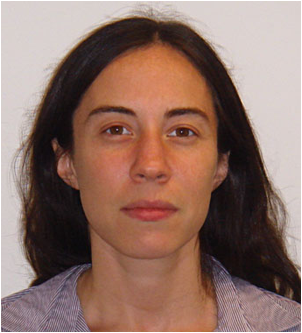 "Cora's Ph.D. research focused on testing inflation with the Cosmic Microwave Background beyond the slow roll approximation. Her work allows for the presence of features in the inflaton potential and enables tests of slow roll and single field inflation that do not depend on the specific form of the potential." - Wayne Hu, PhD advisor. Cora has received a postdoctoral position at the Institute for Advanced Study. Related Links: KICP Members: Wayne Hu KICP Students: Cora Dvorkin Congratulations to Dr. Megan Gralla! July 20, 2011  "Dr. Gralla's thesis work has focused on the redshift evolution of the radio source population in galaxy clusters, over a broad swath of both redshift and cluster mass. Understanding the evolution of this active galaxy population is important for models of heating by AGN of the intra-cluster medium, as well as providing input to models addressing the impact of radio sources on Sunyaev-Zeldovich surveys for galaxy clusters." - Michael Gladders, PhD advisor. Megan has received a postdoctoral position at Johns Hopkins University. Related Links: KICP Members: Michael D. Gladders KICP Students: Megan B. Gralla Congratulations to our graduate students! They have successfully defended Ph.D. dissertations! August 1, 2011 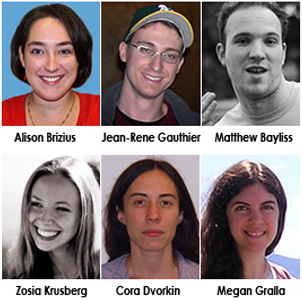
Related Links: KICP Students: Matthew B. Bayliss; Alison Brizius; Cora Dvorkin; Jean-Rene Gauthier; Megan B. Gralla; Zosia Krusberg 2012 KICP Postdoctoral Research Fellowship August 1, 2011 The KICP announces the 2012 Postdoctoral Research Fellowship opportunity. Scientists who have or expect a PhD in Physics, Astrophysics or related fields between September 2008 and September 2012 are invited to apply. Successful applicants will be expected to conduct original research in experimental, observational, numerical or theoretical cosmology in an active interdisciplinary environment. Postdoctoral Scholars are appointed to renewable one-year terms, up to three years. Our positions carry a competitive salary and benefits package. Institute Fellows have the freedom to work on any of the efforts in the Institute. Research at the Kavli Institute for Cosmological Physics (KICP), based at the University of Chicago, is focused on interdisciplinary topics in cosmological physics: studying the inflationary era, characterizing dark energy, and identifying the constituents of the dark matter. Experimental studies of the CMB (polarization anisotropy and the Sunyaev-Zel'dovich effect); analysis of cosmological data including CMB data and large-scale structure survey data; analysis of Sloan Digital Sky Survey data; development of the Dark Energy Survey; gravitational lensing studies; experimental particle astrophysics; direct detection of dark matter particles and numerous topics in theoretical cosmology constitute the current slate of activities. The KICP also has active visitors, symposia, and education/outreach programs. To apply please visit the KICP Postdoctoral Research Fellowship website. Read more >> Open Position: Assistant Director, KICP August 15, 2011 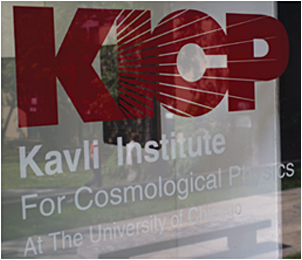 The Assistant Director will report to the KICP Director and will assist the Director, and the KICP's advisory groups, faculty and committees, in developing research goals and in executing plans for scientific, educational and public outreach activities. The Assistant Director will support fundraising activities for the KICP. The Assistant Director is responsible for the day-to-day management of the KICP including the following activities: supervise business office, computing and web-administration personnel; monitor progress and assist in functioning of all KICP committees; organize annual External Advisory Board meetings; oversee planning of symposia and workshops; and work with the financial manager to review monthly accounts. The Assistant Director is responsible for the preparation of annual reports and for satisfying other reporting and compliance requirements for the NSF and the Kavli Foundation, as well as playing a lead role in the preparation of grant/funding applications. The Assistant Director will establish, monitor and control research project budgets. The Assistant Director will work with the leadership of related departments within the University, principally the Astronomy and Astrophysics Department, the Physics Department and the Enrico Fermi Institute, as well as the Center for Particle Astrophysics at Fermi National Laboratory and the Astrophysics Group at Argonne National Laboratory, in planning and carrying out joint activities. An advanced degree in Physics, Astronomy or Engineering or related field is required; PhD degree is preferred. The candidate must have three-years experience in research related administration. Knowledge of the research frontiers of astrophysics, cosmology and particle physics research and the ability to make scientific presentations is essential. The candidate must be self-motivated and independent, have the interpersonal skills to work effectively with a variety of individuals, including faculty, staff, students, visitors, other university administrators and donors, and possess the ability to write scientific reports. To apply, please visit The University of Chicago job site. Position is here. A curriculum vitae must be attached. Individuals must arrange for three letters of reference to be sent. The University of Chicago is an Affirmative Action/Equal Opportunity Employer. The above statements are intended to describe the general nature of the work being performed by people assigned to this position. They do not comprise an exhaustive list of all duties and responsibilities associated with it. Read more >> Michael Turner says We must finish the James Webb Space Telescope August 17, 2011 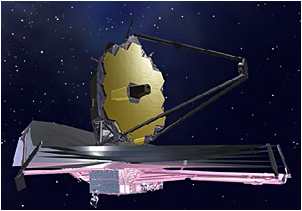 It is barely 12 months since US astronomy was shown the future, with the release of New Worlds, New Horizons in Astronomy and Astrophysics, the latest decadal survey by the National Academy of Sciences. The survey offered a strategy - based on realistic budgets and leveraged by international and private partnerships - to realize dazzling opportunities, including searching for life on other planets, identifying dark matter and understanding dark energy. It also promised to reveal the evolution of the first stars and galaxies and to probe whether supermassive black holes are accurately described by general relativity. It began well, with the Large Synoptic Survey Telescope, the highest priority for ground-based astronomy, put on a path for construction in 2014. But today, US astronomy is in disarray, community morale is low and the proposed cancellation of the James Webb Space Telescope (JWST), the cornerstone of the 2010 decadal survey, is the most glaring example of difficulties ahead. Although capabilities and budgets in Europe and Asia have largely caught up with those of the United States, the health of the US programme remains critical, not just domestically, but also to the rest of the world. As the opportunities have soared and projects have become more complex and costly, government spending on science has been shrinking. NASA's science budget is in steady decline. The House of Representatives has said that it wants to cut another 10% from NASA for 2012 - and that was before the bill to cut domestic spending over the next decade was passed earlier this month. This has undermined NASA's planned collaboration with the European Space Agency (ESA) on the International X-ray Observatory (IXO) and on a space-based interferometer to detect gravity waves - the Laser Interferometer Space Antenna (LISA). Both partnerships were endorsed by the decadal survey, but the Europeans are now looking at cheaper and less-ambitious missions that they can do alone. The decadal survey's top priority was the Wide Field Infrared Survey Telescope (WFIRST), designed to find exoplanets and probe dark energy, but budget trouble has pushed its earliest possible launch into the mid-2020s. By then, much of its key science could have been done by a similar ESA mission, Euclid. (Euclid is competing for a slot in ESA's Cosmic Vision programme, with an announcement expected this October.) The JWST illustrates the complexity of the problems in the US astrophysics programme. With a 6.5-metre deployable mirror and powerful infrared instruments, it will be a hundred times more sensitive than the Hubble Space Telescope and a worthy successor. It will image the first stars and galaxies, and search for water and evidence of life on distant planets. Yet it is at least US$1.6 billion over budget, and last month the House voted to terminate it. The JWST can still be saved, and should be. The budget for 2012 is yet to be settled and there is a groundswell of support for the telescope: professional societies around the globe have issued statements of support, online petitions have been organized and influential commentators have called for its completion. But if the JWST does launch, its cost could yet wreak havoc on the rest of the astrophysics programme. I believe that there is a path forward for astronomy. It will involve hard choices and better international coordination, but the scientific payoffs ahead demand that we try. First, it is essential that the United States finishes the JWST. As well as being the cornerstone of the future astrophysics programme, the telescope will transform global astronomy just as Hubble has. But NASA must spread the additional cost across the agency so that it does not cripple the rest of US astrophysics. This will not be easy, but without a clear plan for the post-shuttle era, NASA is going to need a steady stream of exciting science results to capture the public's imagination and loosen the purse strings of Congress. Second, ESA and NASA will have another opportunity to merge their competing dark-energy missions, Euclid and WFIRST, if Euclid is selected for a Cosmic Vision slot. The agencies should do so, and next year they should seek a renewed partnership on IXO and LISA. Third, agencies on both sides of the Atlantic have their sights set on a giant ground-based telescope, 30 metres or more in aperture, with complex adaptive optics to complement the JWST. Both sides are seeking international and private partners. A coherent strategy to build at least two of these grand machines of discovery - one for the northern sky and one for the southern - is essential. In the United States, the National Science Foundation must clarify the currently muddled situation by picking which of the competing private projects it wants for a partner. And scientists around the world must work together to develop the necessary technology and instrumentation for these billion-dollar telescopes. We are in an unprecedented age of discovery, with opportunities to answer the biggest questions humankind can ask. Where did we come from? Where are we going? Are we alone? If the global science community can figure out how to live on leaner budgets by working together more effectively, this could yet be a golden age for astronomy.
Related Links: KICP Members: Michael S. Turner The proposal for our new Physics Frontier Center -- Pushing Cosmology to the Edge -- has been funded by NSF August 18, 2011 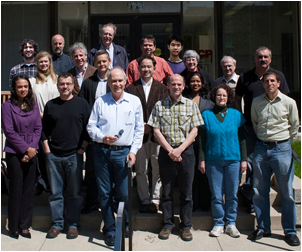 Michael S. Turner, Director John E. Carlstrom, Deputy Director The "Pushing Cosmology to the Edge" PFC at the KICP comprises 8 Major Activities led by the 13 co-Is:
Five research Hubs bring together scientists and projects - from within the PFC and around the world - to get at the new physics underlying inflation, dark energy and dark matter. Initially, four major projects anchor the PFC: Chicagoland Observatory for Underground Particle Physics (COUPP), the Dark Energy Survey (DES), the South Pole Telescope (SPT), and Q/U Imaging Experiment (QUIET). Detector Development and Computational Cosmology are cross-cutting, science-enabling activities. The Conferences, Workshops, and Visitors MA will engage the larger cosmology community, and the Education, Outreach, & Diversity MA will provide opportunities for all PFC members to broaden the impact of their research. The KICP Fellows are the centerpiece of the PFC, and the opportunities afforded them by the PFC will prepare them to be teacher/scholars and future leaders in cosmology. Staff: Valeri Galtsev (Sr System Administrator), Elena Galtseva (Web Developer), Aimee Giles (Travel & Symposium Event Coordinator), Helen C. Pates (Department Administrator), and Mary Wawro (Business Manager). Related Links: KICP Members: John E. Carlstrom; Juan I. Collar; Scott Dodelson; Joshua A. Frieman; Valeri Galtsev; Elena V Galtseva; Aimee Giles; Wayne Hu; Edward W. Kolb; Andrey V. Kravtsov; Randall H. Landsberg; Stephan S. Meyer; Angela V. Olinto; Helen C. Pates; Paolo Privitera; Michael S. Turner; Lian-Tao Wang; Mary Wawro Scientific projects: COUPP/PICO; Dark Energy Survey (DES); Q/U Imaging ExperimenT (QUIET); South Pole Telescope (SPT) The 2012 Kavli Prize call for nominations September 1, 2011  The Kavli Prizes recognize scientists whose discoveries have dramatically expanded human understanding in the fields of astrophysics, nanoscience and neuroscience. Consisting of a scroll, medal and cash award of one million dollars, a prize in each of these areas has been awarded biennially since 2008. The Kavli Prizes are presented in cooperation with the Norwegian Academy of Science and Letters, the Norwegian Ministry of Education and Research, and the Norwegian Ministry of Foreign Affairs. Independent of The Kavli Foundation, Kavli Prize recipients are chosen by three prize committees comprised of distinguished international scientists recommended by the Chinese Academy of Sciences, the French Academy of Sciences, the Max Planck Society, the U.S. National Academy of Sciences and The Royal Society. After making their selection for Award recipients, the recommendations of these prize committees are confirmed by the Norwegian Academy of Science and Letters. Read more >> PFC3 Collaboration Meeting September 27, 2011 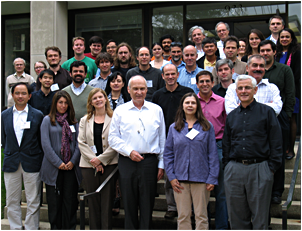 Meeting agenda:
The Nobel Prize in Physics 2011 October 4, 2011 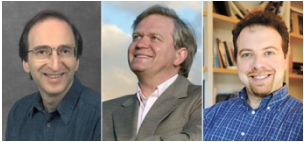 Read more >> Dr. Phil Barbeau has been named co-winner of the 2012 DNP Dissertation Award November 1, 2011 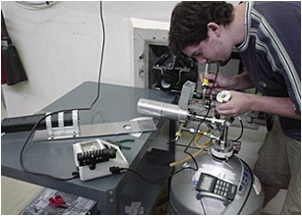 Related Links: KICP Members: Juan I. Collar KICP Students: Phil Barbeau Scientific projects: Coherent Germanium Neutrino Technology (CoGeNT) |





 Overview
Overview